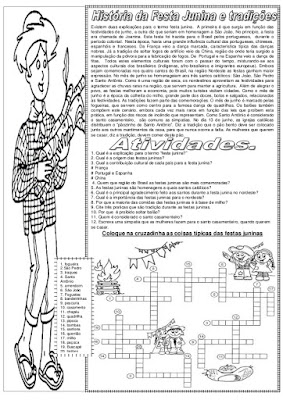Festa Junina, also known as festa de São
João for their part in celebrating the nativity ofSt.
John the Baptist, are the annual Brazilian celebrations
historically related to European Midsummer that take place
in the beginning of the Brazilian winter. These
festivities, which were introduced by the Portuguese
during the colonial period (1500-1822), are celebrated
during the month of June nationwide both in Brazil and
Portugal, but are particularly associated with Northeastern
Brazil. The feast is mainly celebrated
on the eves of the Catholic
solemnities of Saint Anthony, Saint John the Baptist, and
Saint Peter.
As Northeastern Brazil is largely arid or
semi-arid these popular festivals not only coincide
with the end of the rainy seasons of most
states in the northeast but they also provide thepeople with an
opportunity to give thanks to Saint John
for the rain. They also celebrate rural life and feature
typical clothing, food, dance (particularly quadrilha, which is
similar to square dancing). Like Midsummer and Saint John's Day in
Portugal and Scandinavian countries, São João celebrates marital
union. The "quadrilha" features couple formations around a
mock wedding whose bride and groom are the central
attraction of the dancing. [Wikipedia]
1. Mark True or False - verdadeiro ou
falso
A. Festa Junina, also known as festa de São
João for their part in celebrating the nativity of St.
John the Baptist, are the annual Brazilian celebrations
historically related toEuropean Midsummer that take place
in the beginning of the Brazilian summer. (_)
B. Like Midsummer and Saint John's Day in
Portugal and Scandinavian countries, São João celebrates marital union. (_)
C. The feast is no longer
celebrated on the eves of the Catholic
solemnities of Saint Anthony, Saint John the Baptist, and
Saint Peter. (_)
https://www.englishexperts.com.br/forum/exercicio-texto-sobre-festas-juninas-em-ingles-t47158.html



